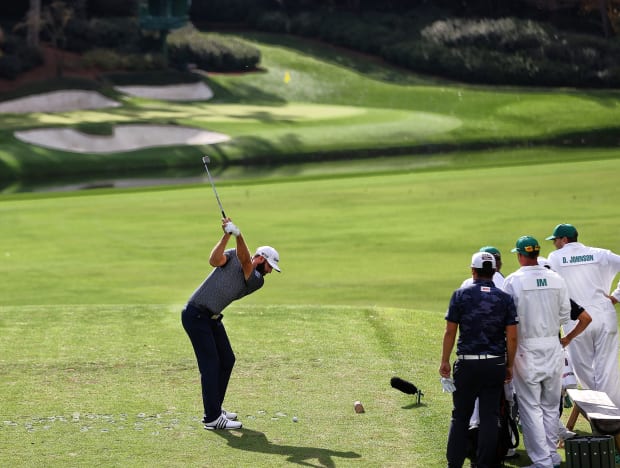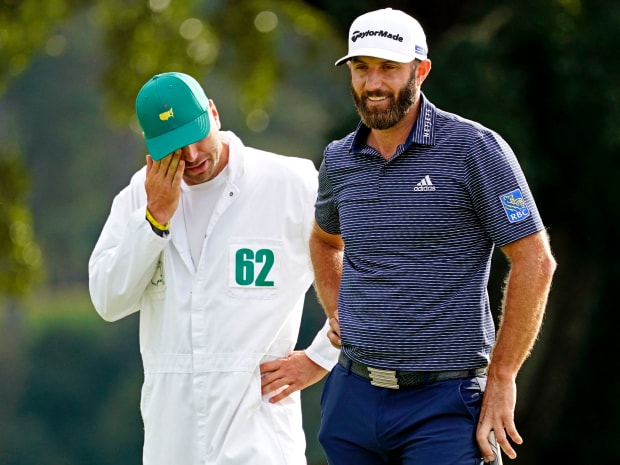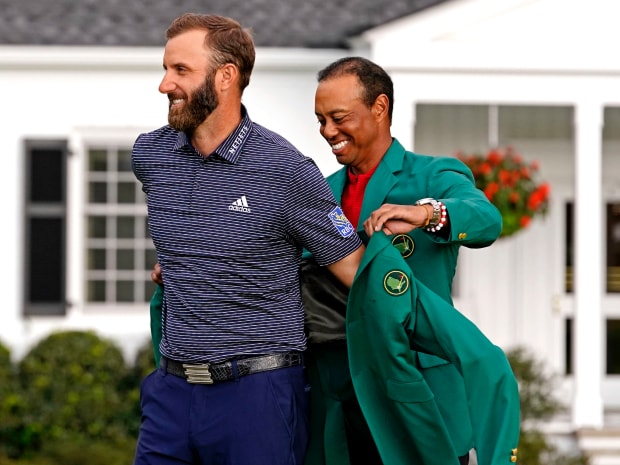Austin Johnson is not one of those revered caddie savants. But he's the right caddie for his brother, and he told Dustin all he needed to know to win the Masters.
AUGUSTA, Ga. – On the greatest Sunday of his golf life, Dustin Johnson walked up the 18th fairway and turned to his caddie and brother, Austin, and asked a question that will be used against him: How do we stand?
“I told him he had a five-shot lead,” Austin said later. “I could kick it in from there. He had no clue.”
D.J. confirmed it later: He did not know what the leaderboard looked like. He also said he wanted to break the Masters scoring record, but he clearly didn’t know what the record was: “It was 19 [under] before?” Nope. It was 18 under. This will all be fuel for those who believe the 2020 Masters champion is not that bright. In fact, it’s a testament to the quirky genius of Dustin Johnson.

This is what Johnson knew when he teed off at 9:39 Sunday morning: He had a four-shot lead, and if he played well, he would win. That was it. That was enough. Golf is as complicated as the golfer makes it, and Johnson is a master at figuring out exactly how much he needs to know. Rory McIlroy, who played with Johnson in the first two rounds, summed up D.J.’s approach like this: “See ball, hit ball, see putt, hole putt, go to the next … he makes the game so simple, or makes it look so simple at times for sure.”
ASSELTA: 18 Parting Thoughts from the Masters
McIlroy has a natural strut. Johnson ambles. He speaks slowly and usually not that much. Austin Johnson said Sunday, “He doesn’t throw clubs or curse at me or do any of that stuff.” People confuse this with indifference, but in fact he cares desperately. Brooks Koepka says majors are easier to win because he knows other players will get nervous and beat themselves; Koepka has convinced himself that he never gets nervous. Johnson admitted Sunday, “I was nervous all day.” He thought the nerves would go away as he got into his round, but they never did.
He eschewed driver for three-wood off the first tee and still found a fairway bunker. He hit his drive on the par-5 second hole in the right rough. Then he needed a restroom break–on the second hole. That is never a good sign. He hit a low three-wood short of the greenside bunker, and even though he was in the fairway, he didn’t like his lie–the ball was “sitting down a little bit, and it was kind of sticky down there,” Austin said, and Dustin tried to hit a perfect shot and he popped it into the bunker. He made par, but that shot was alarming.
He hit his tee shot on the par-3 fourth fat, left it way short of the green, and made bogey.
He hit his drive on the par-4 fifth hole in the fairway bunker, had to lay up, and made another bogey.
As he stood on the 6th tee, with the pin on a back-right shelf, do you know what he did not need?
To look at a leaderboard, that’s what.
He was nervous enough, and he knew it. He just needed to hit a good shot. He hit a great one, made birdie at No. 6, and really didn’t hit a bad shot again. He played the par-5s on the back, Nos. 13 and 15, conservatively but still made birdie. He said afterward, “I knew if I played well, especially from [No.] 8 to the house, that I was going to put myself in a good position and have a chance to win. I just didn't want [the leaderboard] to affect the way that I played. I just didn't look at it. I took what the course gave me and hit the shots I felt I could hit.”
All the while, Austin kept looking at the leaderboards. He said the round “damn sure was nerve-wracking for me.” Austin knew not to tell Dustin what other players were doing. Dustin knew if he really needed to know–if somebody in another group had shot the round of his life, and Dustin needed to make some birdies–Austin would tell him. And so he was free to just play golf.
Austin is not one of those revered caddie savants; he recently marveled at Dustin’s ability to hit a great shot even when Austin gives him the wrong yardage, which is not the kind of thing most caddies would say. But Austin is the right caddie for Dustin. He helps his brother get to the right mental place.
And so when Dustin says he didn’t know where he stood, what he means is: “Not exactly. I mean, I assumed I had the lead, but I didn't know by how many.” He knew if he shot two under or better he would almost certainly win. He knew he was four under through 17. When Austin said he had a five-shot lead, D.J. responded, “I think I can handle this one.” He knew what he had to do next: See ball, hit ball, see putt, leave putt short, hole the tap-in. He finished at 20-under, five strokes ahead of Sungjae Im and Cameron Smith.

Austin wiped away tears four times. Dustin did not. He gave a half a fist-pump and acted like he just shot 66 in the second round of the Houston Open. Only later, when CBS’s Amanda Balionis asked what winning the green jacket meant, did he start to lose it.
Dustin and Austin both talked about being kids, how every putt on the practice green at night was to win the Masters. Dustin actually did it because he did not surround that dream with clutter.
Johnson experimented with a longer, 47-inch driver leading into the Masters, but he thought he would miss too many fairways and so he never used it. He asks Austin for yardage and help reading putts, and not much else. He does not get too fired up or too down.
Austin said, “You can’t tell if we’re coming down the stretch of a major or if we’re laying on the couch watching football by his reactions. He seemed really focused this morning. He had his mind set on what he wanted to do, and it didn’t seem like anything was going to knock him off course from doing that.”
ASSELTA: Dustin Johnson Shows He Can Handle the Pressure
Johnson is so talented that no matter how he does, it always seems like he should do more. He has now won two majors and could easily have won five. But it’s pretty damn hard to win two, and doing it takes a lot more than talent.
“His golf IQ is off the charts,” his swing coach, Claude Harmon, said. “I think we saw that today. I think maybe four, five six years ago, he gets rattled by what happened at the start. I think it’s been very interesting in that all this talk about ‘We’re going to have to change the ball’ and Bryson [DeChambeau] rewriting golf, D.J. did exactly what Tiger [Woods] did back in the day: ‘Let me hit a bunch of fairways. I’m already as long as everybody else.’ If you look at the run Tiger was on in 2000, 2001, he wasn’t trying to hit it past everybody. D.J.’s certainly not trying to hit it past people. He is just trying to give himself as many chances.”
Nineteen months ago, Woods won his fifth Masters title, setting off perhaps the most raucous celebration in Augusta National history. This year, with no tickets because of COVID-19, Johnson won in front of dozens of people, at least three of whom knew how to wear a mask properly. The subdued atmosphere was fitting. Johnson does not really like attention.
Johnson recently had COVID-19 himself, and he said that two weeks of quarantine in a hotel room is no way to get ready for a major. But Johnson always feels good about his game. Harmon said there was nothing about Johnson’s game that worried him entering the week.
McIlroy arrived at Augusta too determined to win; he shot 75 in the first round, negating his 11-under performance the rest of the way. McIlroy is a marvelous player and four-time major champion, but at Augusta he struggles to do what Johnson did: See ball, hit ball, see putt, hole putt. There is no mention of the green jacket there. No talk of celebrating. Simple.
“It's something to admire all the time,” McIlroy said Friday. “I think he's got one of the best attitudes towards the game of golf in the history of the game.”
Johnson is a pleasant but reticent public speaker; he spent all these years dreaming of a Masters win, not the Masters winner’s press conference. When he was asked to say which clubs he hit on each hole, he looked over at a screen that had his scorecard on it, and he started going hole-by-hole. But then the screen changed. He looked like he actually needed it–like he didn’t even know, after all these years, which hole was 14 and which was 17. But that’s just the caricature again. Of course he remembered every shot. He just liked looking at his scorecard as he said it for the same reason he loves having Austin on his bag: It’s comforting.
After Woods put a 42-long green jacket over Johnson’s shoulders, the two champions walked from Butler Cabin to the practice green for the traditional trophy ceremony. Austin Johnson pulled out his camera and started taking video of the best golfer of his lifetime and his brother, both in green jackets. That’s where Dustin Johnson stands now, and where he always will.
